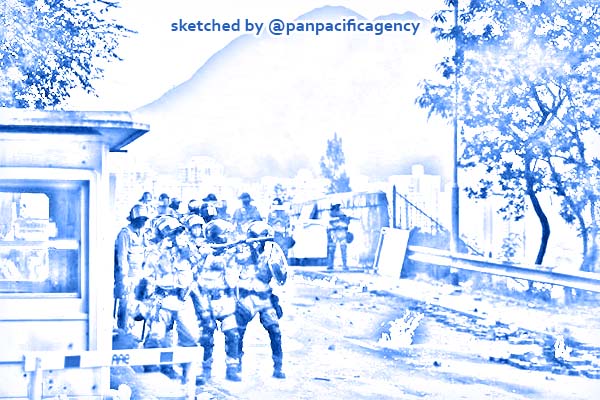[Analytics] China-Hong Kong: The end of ‘one country, two systems’?

Riot police aim tear gas gun to university students during a crash at Chinese University in Hong Kong, Monday, Nov. 11, 2019. AP-Yonhap. Sketched by the Pan Pacific Agency.
In May 2020, China’s National People’s Congress (NPC) passed a resolution to impose a national security law on Hong Kong. Chinese leaders defended the move as essential for China’s security — closing a gap that could be exploited by hostile countries to introduce a colour revolution to China. Joseph Yu Shek Cheng specially for the East Asia Forum.
Hong Kong’s Basic Law allows the NPC to introduce legislation for the Hong Kong Special Administrative Region (HKSAR), to be attached to Annex III. This provision allows Chinese authorities to retain final legal control.
A June poll by the Hong Kong-based newspaper Ming Pao reveals that 64 per cent of respondents believe the national security law damages the ‘one country, two systems’ model. Hong Kong’s pro-democracy movement also considers this the end of the governing model. They argue that the law was imposed without consulting Hongkongers, completely bypassing the local legislature.
Tightening control over Hong Kong is the logical response of the Chinese authorities and the HKSAR government to the political turmoil of 2019. The local government refuses to engage the pro-democracy movement and protesters, and it rejects any attempts of reconciliation. COVID-19 has, for the most part, curbed large-scale protests this year but public anger and dissatisfaction is still accumulating. There will likely be significant outbursts in the months before the Hong Kong Legislative Council elections on 6 September.
There is a small chance that the pro-democracy movement may secure a majority of seats in the Legislative Council elections despite the absence of universal suffrage in the less than democratic electoral system. The pro-democracy movement hopes that a high voter turnout and successful coordination among pro-democracy groups to optimise the number of candidates in the multi-member, single vote, medium-size constituencies can achieve a small miracle. The high turnout rate of 71 per cent in the November 2019 District Council elections gave the pro-democracy camp a landslide victory, capturing a majority in 17 out of 18 local councils.
The pro-democracy movement probably sees the national security law as the last straw, though the decision to introduce the law had already been made at China’s Communist Party Central Committee plenum last October. It was part of the policy program to crack down on the pro-democracy movement.
On 18 April, then Constitutional and Mainland Affairs secretary Patrick Nip Tak-kuen released three versions of the interpretation of Article 22 of the Basic Law to justify that the Central Liaison Office in Hong Kong and the State Council’s Hong Kong and Macau Affairs Office have the authority to supervise the HKSAR.
On the same day, fifteen prominent pro-democracy leaders, including Martin Lee and Jimmy Lai, were arrested for participating in and organising illegal protests. This confirmed a trend of suppression since the government’s rejection of political reforms in 2014 that triggered the Occupy Central movement. The soft line that political reforms would be a gradual process and democracy would arrive when conditions were ripe was abandoned. Chinese authorities chose to inform the local community that they would define the parameters of ‘one country, two systems’. This hard line gradually stoked the pro-democracy movement until political turmoil erupted in June 2019.
Anger in the community, especially among young people, finally burst. Police brutality rapidly escalated the violence in the clashes between the protesters and the police. The use of Molotov cocktails could not have been imagined. The alienation and opposition against the Chinese authorities probably convinced the police that concessions to the pro-democracy movement were futile.
Chinese President Xi Jinping maintained a hawkish line and appealed to nationalism and patriotism during the protests. Though Hongkongers won the sympathy of the international community, people in China supported their leaders. The Chinese leadership likely anticipated a strong response from the West to the arrest of the pro-democracy leaders and the release of the Hong Kong national security law. But it was willing to pay the price.
As demanded by the pro-democracy movement, the Trump administration accepted the argument that the ‘one country, two systems’ model had been terminated and signalled its intention to withdraw privileges granted to the territory. This will hurt Hong Kong’s economy, though the pro-democracy movement is willing to pay the price too.
US–China relations have been deteriorating as the US government and public are re-assessing the nature of their relationship with China. Indeed, US engagement with China has been replaced by containment. It perceives China as a threat to US values and global leadership. Hong Kong is now high on the agenda of this bilateral relationship. It appears that the Trump administration is the only Western government ready to impose sanctions on China on behalf of Hong Kong. Further, the 2020 US presidential election campaign may help to maintain the US public’s attention on Hong Kong.
The short-term future for Hong Kong is bleak and many people are prepared to emigrate. But the political struggle will continue and the pro-democracy movement will try to minimise the cost of this struggle in the ‘one country, two systems’ context, denying the HKSAR government its legitimacy. Apparently, Chinese authorities still hope to maintain the functioning of Hong Kong as an international financial centre, but without respect for the rule of law and human rights.
Joseph Yu Shek Cheng is a retired professor of political science based in Hong Kong.